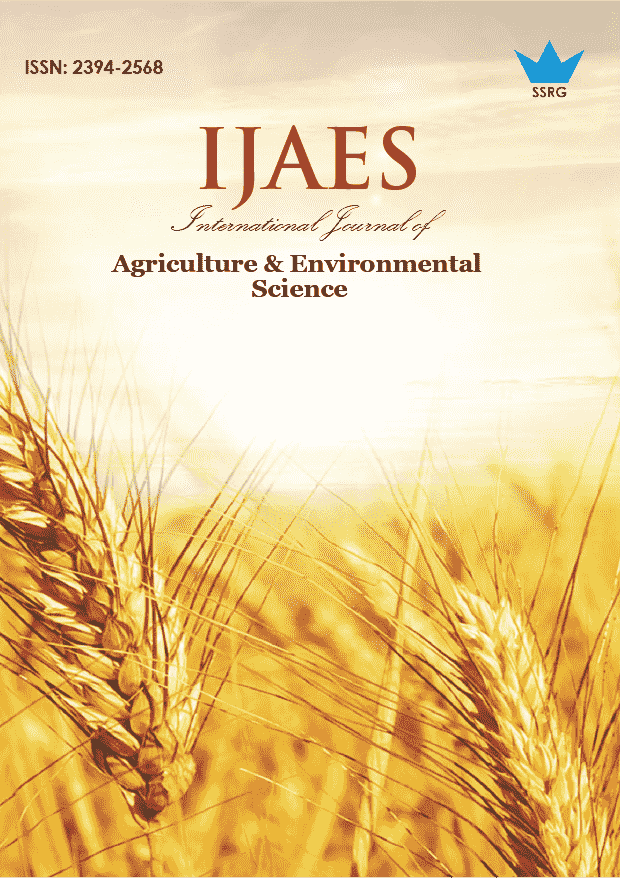Hydrochemical And Microbiological Study of Urban River Waters In The Agglomeration of Brazzaville (Republic of Congo)

| International Journal of Agriculture & Environmental Science |
| © 2021 by SSRG - IJAES Journal |
| Volume 8 Issue 4 |
| Year of Publication : 2021 |
| Authors : M. Ngouala Mabonzo |
How to Cite?
M. Ngouala Mabonzo, "Hydrochemical And Microbiological Study of Urban River Waters In The Agglomeration of Brazzaville (Republic of Congo)," SSRG International Journal of Agriculture & Environmental Science, vol. 8, no. 4, pp. 29-36, 2021. Crossref, https://doi.org/10.14445/23942568/IJAES-V8I4P104
Abstract:
To study the waters of the urban rivers of Brazzaville in the Republic of Congo for environmental needs, it was necessary to determine the various parameters influencing the quality of the water in these urban rivers. Their physicochemical elements were monitored throughout the hydrological cycle of 2020 in all of these rivers. The results of the chemical analyzes were processed by hydrochemical and statistical methods. The spatial distribution of the elements shows the same evolutionary pace as that observed for anions and cations. It appears that the waters of these rivers are characterized by low contents of dissolved salts. This could be explained by the importance of surface feeding. The Principal Component Analysis and the Ascending Hierarchical Classification indicate that the mineralization of these waters is controlled by two major phenomena: mineralization which results in the pluvi-leaching of soils for surface water and, anthropogenic activities in the production of waste pollutants. This study also shows that the waters of these rivers are contaminated by total germs, fecal and total coliforms which are the consequence of recent anthropogenic pollution.
Keywords:
Congo, Brazzaville, urban rivers Principal Component Analysis, Ascending Hierarchical Classification.
References:
[1] Cosson J,. AEF reconnaissance geological map. Sheet N°SB-32. BORN.1 Pointe-Noire at 1: 500,000. Department of Mines and Geology of the AEF (1955).
[2] Dadet P,. Explanatory note of the geological map of the Republic of Congo-Brazzaville at 1: 500,000 (zone between the parallels 2 ° and 5 ° south). Memoirs of the BRGM, Paris, 70 (1969).
[3] Ghazali D., Zaid A. Study of the physico-chemical and bacteriological quality of the waters of the Ain Salama-Jerri spring (Meknes region - Morocco), Larhyss journal, (12) (2013) 25-36.
[4] Güler C., Thyne G.D., Mccray J.E., Tuner A.K.,. Evaluation of graphical and multivariate statistical methods for classification of water chemistry data. Hydrogeology Journal, 10 (2002) 455-474.
[5] Hamzaoui A.F., Bouhlila R., Gueddari M., Characterization of water from the Triassic sandstone (South-East of Tunisia) by geochemical and statistical methods. Geo-Eco-Trop, 36 (2012) 49-62.
[6] Host S., Telle-Lamberton M. The urban environment, receptacle of multiple nuisances, Territories, health incubators. The IAU îdF Notebooks, (2014) 170-171, 36-39.
[7] Koechlin J.,. The vegetation of the savannas of the South of the Republic of Congo. Thesis No1 ORSTOM, Montpellier, 310 (1961).
[8] Kouassi M.A., Yao A.K., Ake Y.A., Biemi J., Application of multivariate statistical analysis methods to the study of water mineralization in fissured aquifers in the Guiglo-Duekoué zone (West of Côte d'Ivoire). Int. J. Biol. Chem. Sci., 5 (2011) 2155-2169.
[9] Le Marechal A., Contribution to the study of the Batéké plateaus, Geology, Geomorphology, Hydrogeology. ORSTOM, Brazzaville, 24(1966).
[10] Majdoub R., Dridi L., M’Nasri S., Characterization of the deep northern gafsa water table following the overexploitation of groundwater. Larhyss Journal, n°17 (2014) 179-192.
[11] Makany L., Vegetation of the Téké plateaus (Congo). Works of the Marien Ngouabi University, Thèse d'Etat Paris, Orsay, (1976) 260-301.
[12] Matini L., Moutou J.M., Kongo - Mantono M.S., (2009). Hydrochemical evaluation of underground water in urban areas southwest of Brazzaville, Congo. Africa Science, 05 (1) (2009) 82-98.
[13] Mbilou U.G., Tchoumou M., Ngouala Mabonzo M., Balounguidi J., Hydrogeo chemical and microbiological characterization of ground water in the multilayer aquifer system of the Pointe-Noire region in the Republic of Congo. Larhyss Journal, n°28 (2016) 257-273.
[14] Mina A., Abdes S.B., Vulnerability and risk of groundwater pollution. Proceedings of JSIRAUF, Hanoi, (2007) 6-9, 10.
[15] Moukandi - N’kaya G.D., Hydrogeological and hydrochemical study in situ and hydrodynamic modeling of the aquifer system of the sedimentary basin of the Pointe - Noire region. Doctoral thesis. Marien Ngouabi University, Congo- Brazzaville, 132 (2012).
[16] Moukolo N., Systematic controls of the quality of natural waters in Congo: some results from the hydrology laboratory of Orstom/DGRST in Brazzaville. Bulletin de liaison du CIEH n°92 (1993) 11-22.
[17] Ngouala Mabonzo M., Mapping of the underground hydrology of the Loémé watershed using the geographic information system (S.I.G). Doctoral thesis. Marien Ngouabi University, Congo- Brazzaville, 184 (2016).
[18] Nzila J.D., The soils of the Congo and the problems of land use planning. ENS, Brazzaville, 68 (2001).
[19] OMS, Guidelines for Drinking-Water Quality. Third edition, incorporating the first and second Addenda, Recommendations, 515 (2008).
[20] Samba-Kimbata M.J. The climate of Bas Congo. 3rd cycle thesis, Center for Climatology Research, Faculty of Letters and Human Sciences, University of Bourgonne, Dijon (France), 268 (1978) .
[21] Tapsoba S.A.,. Contribution to the Geological and Hydrogeological study of the region of Dabou (South of Côte d'Ivoire): Hydrochemistry, Isotopy and Aging index of groundwater, 3rd cycle thesis of the National University of Côte d'Ivoire, 200 (1995).
[22] Tchoumou M., Kami-Ouako M., Gampio Mbilou U.G., Ossebi J.G.,. Comparative study of the physicochemical parameters of the waters of four rivers in the city of Brazzaville, Republic of the Congo. Larhyss Journal, n°29 (2017) 61-74.
[23] Yidana S.M., Ophori D., Banoeng-Yakubo B.,. A multivariate statistical analysis of surface water chemistry data – The Ankobra Basin, Ghana. Journal of Environmental Management, (86) (2008) 80 - 87.

 10.14445/23942568/IJAES-V8I4P104
10.14445/23942568/IJAES-V8I4P104